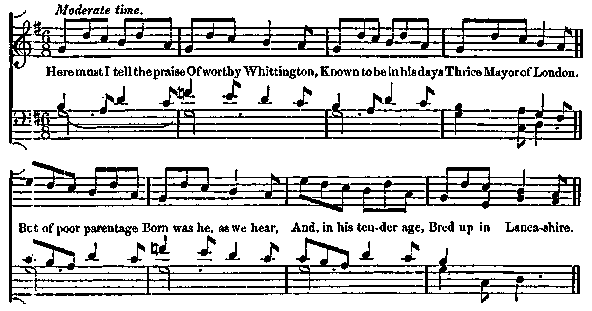Popular Music Of The Olden Time Vol 2
Ancient Songs, Ballads, & Dance Tunes, Sheet Music & Lyrics - online book
| Share page | Visit Us On FB |
|
|
||||
|
REIGN OF CHARLES II. |
517 |
|||
|
|
||||
|
it. He also added, that no man whatever should be imprisoned for any debt due to his estate. " Look upon this, ye aldermen," says the historian emphatically, " for it is a glorious glass ! " a
The ballad was entered at Stationers' Hall a few months later than a drama on the same subject. The following extracts are from the registers of the Company. On Feb. 8,1604-5, entered to Tho. Pavier, " The History of Richard Whittington, of his lowe birthe, his great fortune, as yt was plaied by the Prynce's Servants;" and on July 6 (1605), to Jo. Wright, "a ballad called The wondrous Lyfe and memorable Death of Sir Ri: Whittington now sometyme Lo: Maior of the honorable Citie of London."
Wright was the printer. The ballad (or another on the same subject) was written by Richard Johnson, author of The Seven Champions of Christendom' &c, and is contained in his Crowne Garland of Croulden Hoses, 1612. Copies are also in the Douce Collection, fol. 103; in Old Ballads, i. 132, 1723; in Evans's Collection, ii. 325, 1810; and in Mackay's Songs of the London Prentices and Trades; &c.
In Pills to purge Melancholy, iii. 40, 1707, the tune is called Turn again, Whittington; in Hawkins's transcripts of virginal music, The Bells of Osney ;b and as the ballad of " Sir Richard Whittington" was to be sung to the tune of Dainty, come thou to me, this may be another name for the same. A fourth seems to be Whittington's Bells; for Ward, in The London Spy, says " he'd rather hear an old barber ring Whittington''s Bells upon the cittern," than all the music-houses then afforded. |
||||
|
|
||||
 |
||||
|
|
||||
|
■ For more about Sir Richard Whittington, see Antiquarian Repertory, ii. 343; Rimbault's Fly Leaves, if. 75; Burn's Descriptive Catalogue of London Traders' Tavrnand Coffee-House Tokens; &c.
b*'The belis of Osney Abbey," says Hawkins, "were very famous: their several names were Douce, Clement, Aus'In, Hautecter, Gabriel, and John. Near old Windsor,' he adds, "is a public-house, vulgarly called The |
Bells of Bosely; this house was originally built for the accommodation of bargemen, and others, navigating the river Thames between London and Oxford. It has a sign of six bells, i.e., the bells of Osney." (History, 8vo.p 615.) I am told that the sign is now altered to The Five Bells of Ouseley, and that the house is famous for its excellent ale. "The great Bells of Oesney," is one of the rounds for three voices in Deuteromelia, 1609. |
|||
|
|
||||